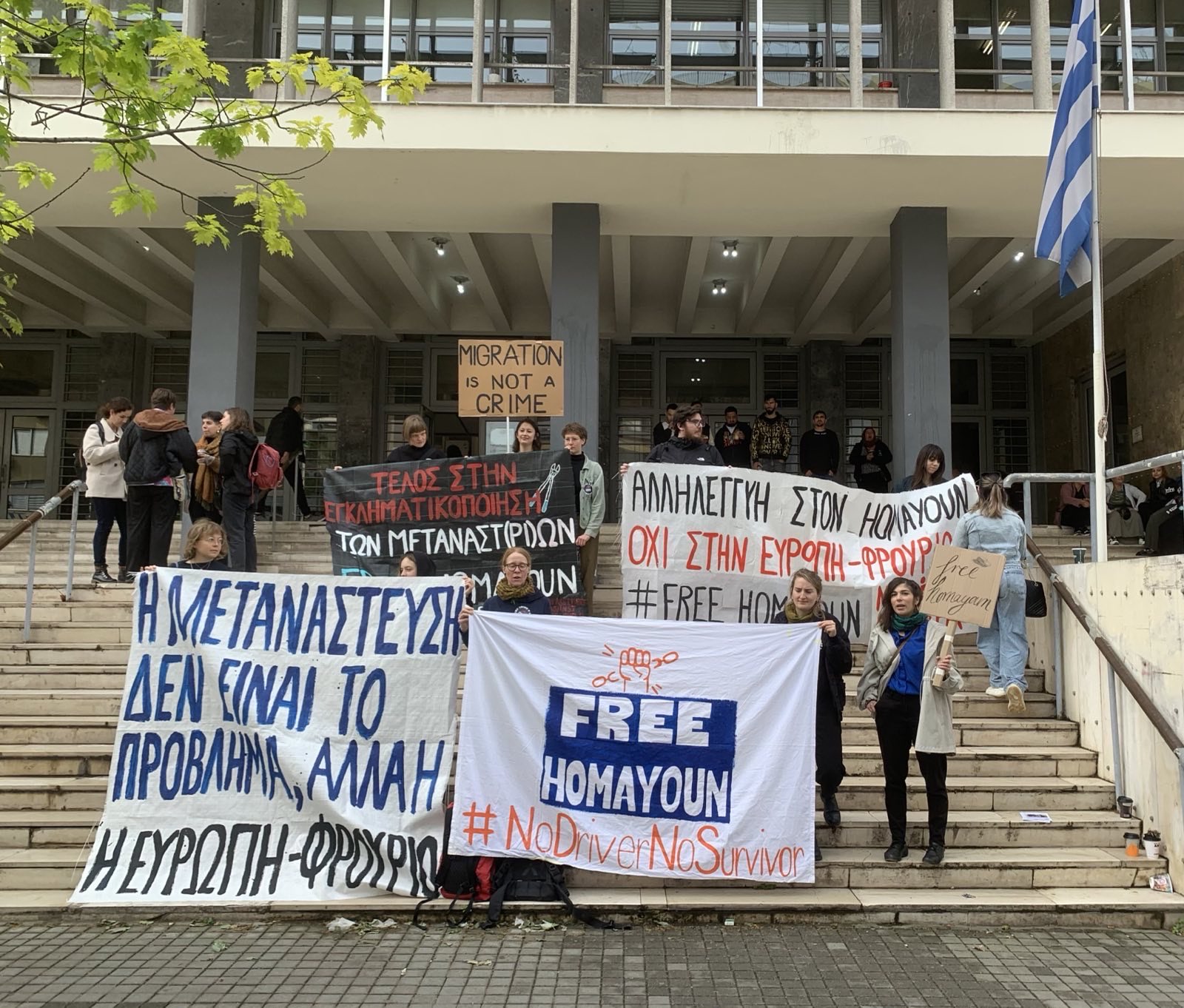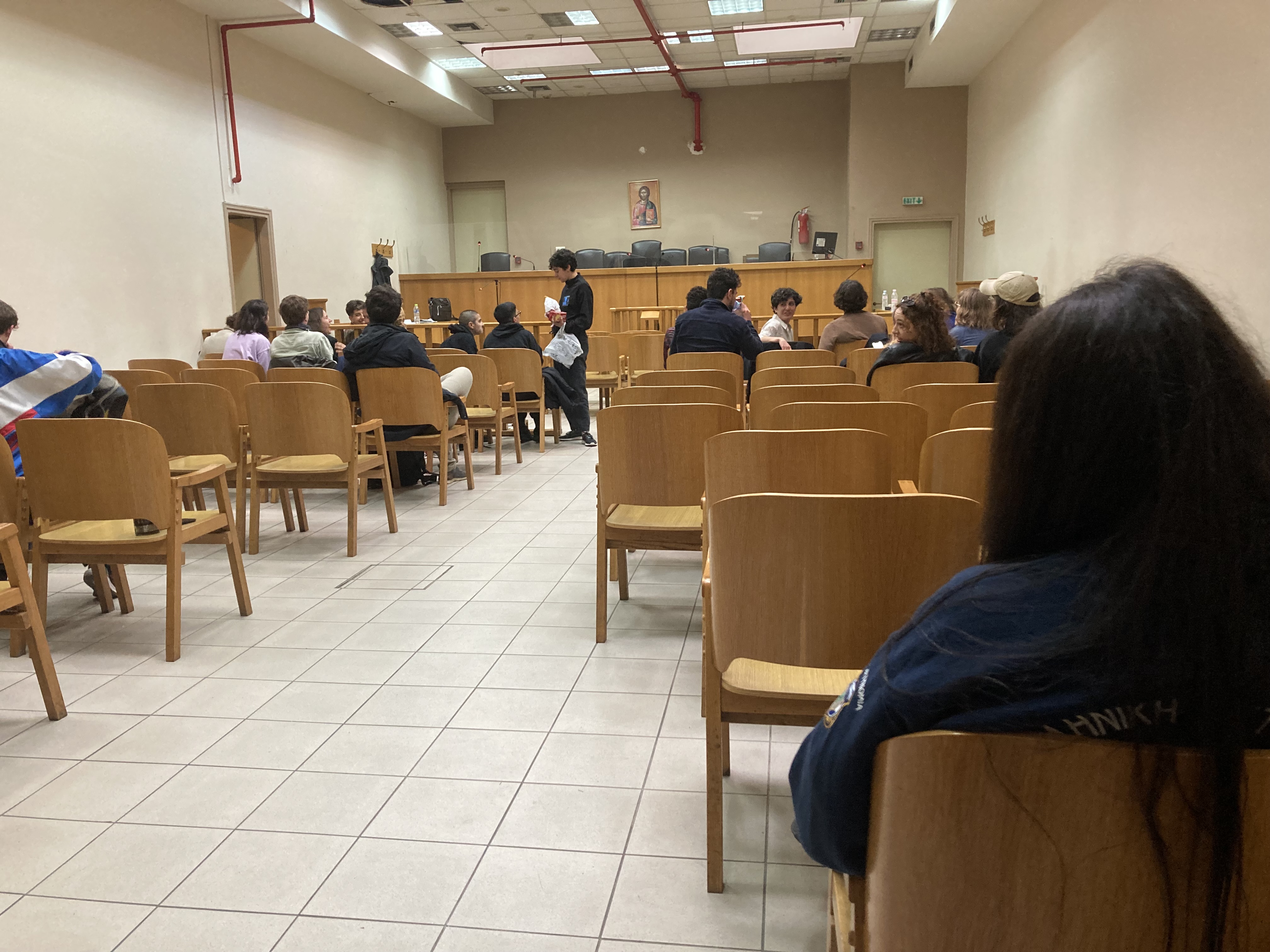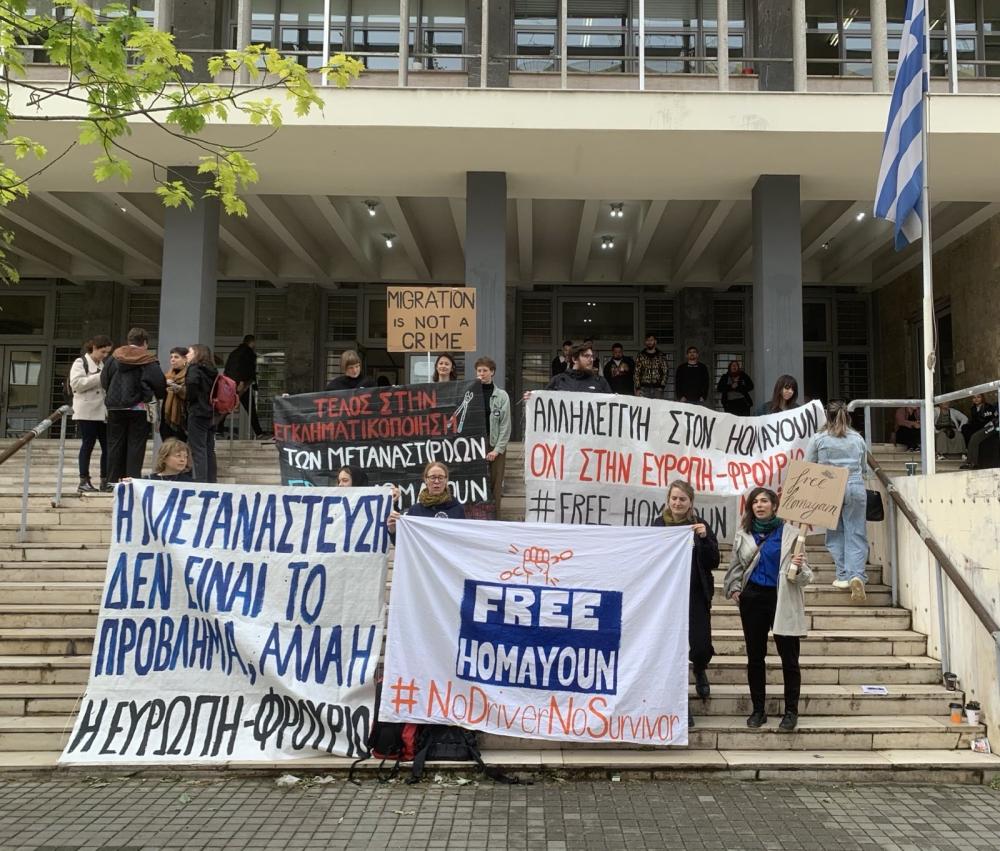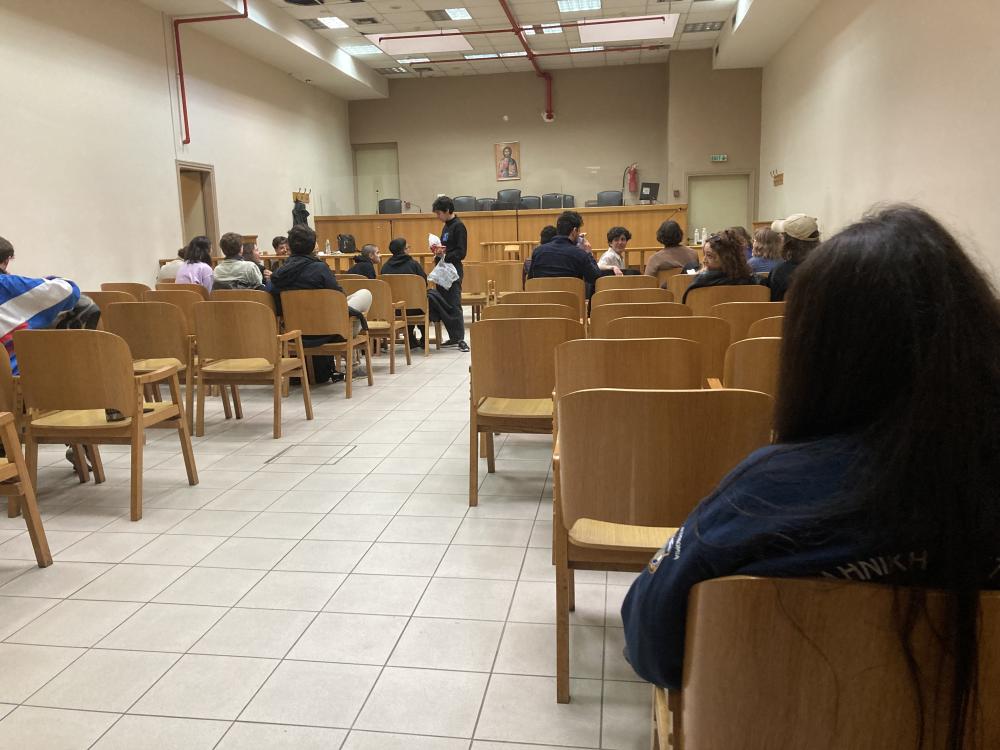Appeal Trial Postponed: Homayoun Sabetara's Case Highlights Systemic Injustice Faced by Migrants Accused of Smuggling
by Julia Winkler, borderline-europe
On April 23, 2024, the appeal trial of Homayoun Sabetara took place in front of the 3-member appeal court of Thessaloniki. After waiting nearly 1.5 years for the trial to occur, Mr. Sabetara faced another postponement for an additional five months because the court had once again failed to secure the presence of the main prosecution witness. His case is a blatant example of the systemic injustice endured by many third-country nationals accused of smuggling in Greece. Trapped between accepting unjust sentences or enduring prolonged incarceration, there is nothing like justice for them.
Initially set for April 22, the trial saw Sabetara's children, Greek and international supporters rallying outside the court building, demanding his release and an end to the criminalization of migration. The #FreeHomayoun campaign, which Mahtab Sabetara had initiated for her father following his first-instance conviction, had been mobilising for months towards the date. By then, he had spent 575 days in prison since his arrest. In his first trial on 26 September 2022, he had been sentenced to 18 years for smuggling because he drove a car with seven other people on the move from the Evros border inland. Borderline-europe was also present back then, providing support to the family and documenting the trial.
However, Mr. Sabetara's trial was assigned number 22, leaving uncertainty hanging over the entire day regarding whether the trial would take place, as his fate depended on the duration of preceding trials. As the court closed at 3 pm without reaching his case, it was postponed to the following day. Distressingly, his daughters were not even permitted a brief visit to the court cells where he was held. Recognizing that lawyers, family members, and supporters had traveled from different locations inside and outside of Greece to Thessaloniki to join the trial, the lawyers managed to at least secure a fixed time for it to take place - at 12 pm the next day.
On Tuesday, 23 April 2024, at around 12:15 pm, the trial commenced. Initially, the police officer who arrested Mr. Sabetara in 2021 was questioned for about 15 minutes. He remarked on the good behavior of everyone intercepted in the car at that time, including Mr. Sabetara. When asked whether he believed Mr. Sabetara was smuggling the others, he stated that he couldn't confirm this, except for the fact that he was the driver. No weapons or communication devices were found in the car. Mr. Sabetara's arrest was based solely on a witness statement from another passenger, which served as the basis for his guilty verdict and 18-year sentence in the first-instance trial.
The crucial prosecution witness, however, was never summoned by the court for cross-examination. Instead, during Mr. Sabetara's first trial, the court simply read aloud the written testimony. Mr. Sabetara's defense had promptly objected to this practice during the first instance trial, citing a breach of Article 6 of the European Convention on Human Rights, which guarantees the right to a fair trial and specifically includes the right to cross-examine witnesses against the defendant, particularly when their statement constitutes key or sole evidence, as in the case of Mr Sabetara. Despite these objections, the court proceeded to rely on the written statement in 2022, ultimately finding Mr. Sabetara guilty.
Remarkably, 1.5 years later, the court of appeal demonstrated a similar disregard by failing to ensure the presence of this crucial prosecution witness, neglecting its responsibility and suggesting a systemic flaw. The defense reiterated its objection, criticizing the procedural errors. Additionally, the defense insisted that Mr. Sabetara's own testimony should not be considered due to the lack of translation provided during his initial interrogation. Both objections were opposed by the prosecution. Furthermore, the lawyers argued, and submitted relevant case law from other courts in Greece, that Mr Sabetara should not be criminalised for facilitating unauthorised entry due to his status as an asylum seeker.
Clearly unaccustomed to such objections, at 1 pm the court announced a one-hour recess for deliberation.
When the trial resumed around 2 pm, there was a collective sense of shock as the court neither decided to consider nor dismiss the witness's statement but instead announced its intention to inquire with the foreigner's department about the crucial witness's whereabouts and to postpone the trial for an additional five months, until 24th September 2024. Notably, this is a step that should have been taken by the court as early as September 2022 during the first trial. This decision places a glaring injustice upon the defendant, needlessly prolonging his period of incarceration for another five months, with no assurance of the witness's eventual presence. It underscores the court's failure to fulfill its duty, as well as the unjust grounds upon which Mr. Sabetara was initially sentenced.
In response, the defense promptly requested Mr. Sabetara's release under specific conditions until the rescheduled trial date, proposing that he await proceedings in Thessaloniki while regularly reporting to the police. However, this plea was summarily dismissed by the court, seemingly without a thorough assessment of the situation.
Systemic injustice faced by third-country nationals charged with smuggling within the Greek justice system
Mr. Sabetara's trial epitomizes the systemic injustice faced by third-country nationals charged with smuggling within the Greek justice system. Their rights are routinely violated in trials based on questionable evidence.
Data collected by borderline-europe, documenting over 80 smuggling trials against third-country nationals in Greece, reveals that what happened to Mr. Sabetara is the norm rather than the exception. It is typical for the prosecution to rely solely on the testimony of a coast guard or police officer and/or on statements from other passengers. Still, in the majority of these cases, prosecution witnesses are absent during the trial, depriving the defense of the opportunity to cross-examine them. In a staggering 68% of documented cases, police officers providing testimonies did not appear in court. The situation is even more dire for passengers whose testimonies are pivotal, as they were present in only 10% of proceedings. Despite concerns voiced by interviewed lawyers about the circumstances surrounding the acquisition of statements from other passengers, such as lack of translation or coercion, the court consistently leans on these written statements as adequate evidence to secure guilty verdicts.
Usually, these violations go unchallenged. The structural conditions surrounding smuggling cases in Greece make it difficult for defendants and their lawyers to challenge these rights violations in court. Doing so often results in a postponement of the trial, which poses a significant challenge for the accused, particularly those in (pre-trial) detention. This is further exacerbated by the slow pace of the Greek judicial system in general, so a delay could mean not just a few weeks but rather several more months. Lawyers are thus faced with the dilemma of having to choose between prioritizing the fundamental rights of their clients, which, if upheld, would negate the basis for their client's conviction, or securing the best possible outcome for them as quickly as possible within the existing circumstances, accepting unjust sentences and significant rights violations.
This situation not only results in the majority of these rights violations remaining unaddressed within domestic courts but also makes pursuing them further in the European Court of Human Rights a daunting task from the outset. One of the fundamental prerequisites for the European court to intervene is that the defense must have lodged objections to the violations and exhausted all available national remedies.
As a result, there is a glaring lack of accountability for these breaches of due process, allowing them to persist as chronic issues. This absence of consequences fosters a sense of immunity among those involved, exacerbating the systemic injustices faced by third-country nationals accused of smuggling.
In Mr. Sabetara's case, he was initially sentenced to six years per transported person ("khatirxi") under Article 30 of Greek criminal law, resulting in a cumulative prison term of 18 years following a specific calculation. According to Greek law, he would need to serve at least 3/5 of this time, approximately 10.8 years. The goal for the appeal proceedings is to at least reduce his sentence to what is known as "filakisi". In cases where the sentence imposed for each person transported is up to five years ("filakisi"), the maximum term of imprisonment cannot exceed 8 years, irrespective of the total sum of the aggregated penalties. Conditional release becomes possible after 2/5 of the sentence is served, equaling 3.2 years. Mitigating factors can further decrease the length of prison sentences, as well as if the person is working in prison.
Mr. Sabetara has been in custody since August 25, 2021, and he would soon have served the minimum term required if his sentence were reduced to filakisi. His defense team could have pursued a strategy focused solely on reducing his sentence from khatirxi to filakisi, acquiescing to the court's assumptions and rights violations, and pleading guilt and regret, a common approach in such cases.
However, they argued not only that Mr. Sabetara's conviction was unfair due to lack of translation and the absence of the main witness, but also that he should not be criminalized at all due to his status as an asylum seeker. This strategy was not only politically sound but also recognized the uncertainty surrounding the outcome if the defense had not raised objections. Without these objections, the court might have not postponed the proceedings on April 23, 2024, but maybe maintained the khatirxi status. In such a scenario, Mr. Sabetara would have no further recourse for appealing his sentence except before the Greek Supreme Court. However, the Supreme Court, as the ECHR, solely reviews procedural errors, which would have been absent from the file in this case.
Homayoun's trial is a blatant example of the systemic injustice endured by most third-country nationals accused of smuggling in Greece. Trapped between accepting unjust sentences or enduring prolonged incarceration, there is nothing like justice for them.
It remains to be seen how the court will handle the situation in September. If the main witness for the prosecution can be located and questioned by the defense, it could potentially shed light on a different perspective, possibly leading to a reevaluation of Mr. Sabetara's case. However, the more likely scenario is that the witness will not be present, effectively forcing the court to dismiss the testimony upon which Mr. Sabetara's conviction was based.
We will continue to support H. Sabetara and his family in the appeal trial and in the meantime!
We demand the immediate release of H. Sabetara from prison, freedom for all those arrested for driving a boat or car, and an end to the criminalisation of migration and the imprisonment of people on the move!
Background info:
- borderline-europe: Greece: Father sentenced to 18 years in prison for driving car with refugees
- borderline-europe: Greece: Because a 58-year-old father wanted to join his daughters in Berlin, he now faces 100 years in prison
- borderline-europe: Study: A legal vacuum - the systematic criminalisation of migrants for driving a boat or car to Greece
- borderline-europe: Criminalization of migraiton and solidarity




